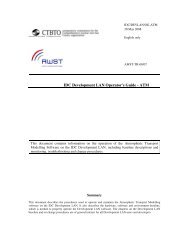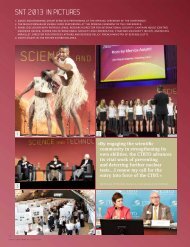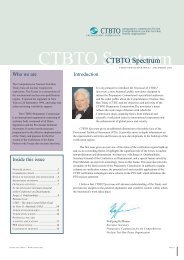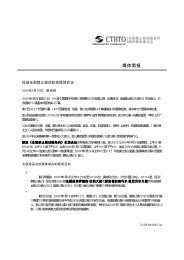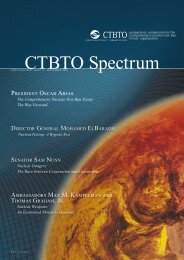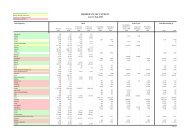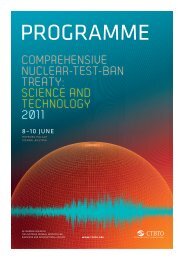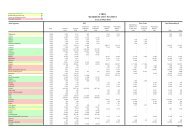English (7 MB) - Comprehensive Nuclear-Test-Ban Treaty ...
English (7 MB) - Comprehensive Nuclear-Test-Ban Treaty ...
English (7 MB) - Comprehensive Nuclear-Test-Ban Treaty ...
- No tags were found...
Create successful ePaper yourself
Turn your PDF publications into a flip-book with our unique Google optimized e-Paper software.
FOREWORDBy the Executive SecretaryOn 10 September 1996, the General Assembly ofthe United Nations adopted the <strong>Comprehensive</strong><strong>Nuclear</strong>-<strong>Test</strong>-<strong>Ban</strong> <strong>Treaty</strong>, which marked the conclusionof intensive negotiations in the Conference on Disarmamentin Geneva. The <strong>Treaty</strong> bans all nuclear testexplosions, for military or other purposes, and providesfor the establishment of a global verification regimecomprising an International Monitoring System, a consultationand clarification process, on-site inspectionsand confidence building measures. It is stipulated thatthe verification regime must be capable of meeting theverification requirements of the <strong>Treaty</strong> at its entry intoforce.On 19 November 1996, the Secretary-General of the United Nations conveneda meeting of States Signatories, which adopted a Resolution establishing thePreparatory Commission for the <strong>Comprehensive</strong> <strong>Nuclear</strong>-<strong>Test</strong>-<strong>Ban</strong> <strong>Treaty</strong>Organization. Acting in conformity with the Resolution, the Commissionestablished the Provisional Technical Secretariat (PTS) to assist it in carrying outthe necessary preparations for the effective implementation of the <strong>Treaty</strong>.The PTS, located in Vienna, has now been in existence for around four yearsand I am pleased to report that, within this period, the PTS has matured into afully fledged international organization capable of fulfilling its mandate effectivelyand efficiently. Following the guidance of the Preparatory Commissionand its subsidiary organs - Working Group A (on administrative and budgetarymatters), Working Group B (on verification matters) and the Advisory Group(on financial, budgetary and administrative matters) - the PTS has achieved significantprogress. This report provides coverage of the achievements during theyear 2000 in the implementation of the Commission’s seven Major Programmes:International Monitoring System; International Data Centre; Communications;On-Site Inspection; Evaluation; Policy-Making Organs; and Administration,Coordination and Support.In regard to the International Monitoring System (IMS), the responsibilities ofthe Preparatory Commission include establishing a worldwide network of 321stations (170 seismic, 60 infrasound, 11 hydroacoustic and 80 radionuclide stations)supported by 16 radionuclide laboratories. This network will be capableof registering vibrations underground, in the air and in the sea, as well as detectingradionuclides released into the atmosphere from a nuclear explosion. Muchprogress has been made in the IMS programme: about 31% of the stations havebeen installed or substantially meet the required specifications (compared withabout 16% at the end of 1999); and 21 stations already send data to the InternationalData Centre over the Global Communications Infrastructure. A significantmilestone was reached in 2000 with the first certification of stations asmeeting all the technical requirements for IMS stations. By the end of 2000, thePTS had certified 11 stations.



